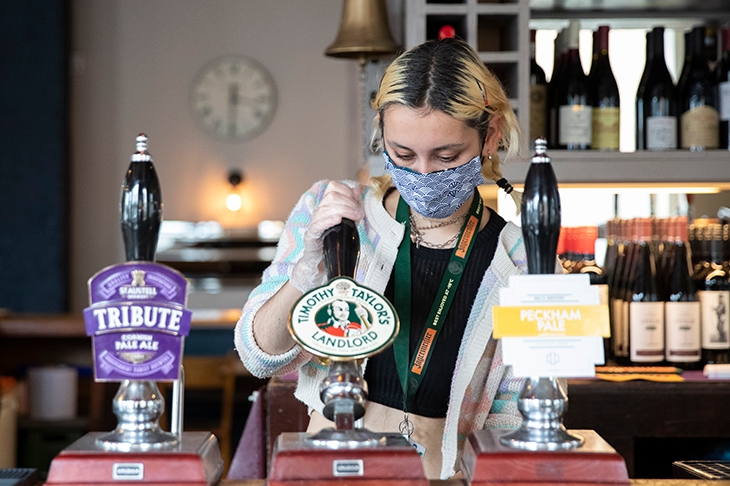In Tess of the d’Urbervilles, Thomas Hardy has a running skit about the alehouse in his heroine’s home village where her father, and quite often mother too, disappear for hours at a time. People aren’t allowed to drink on the premises, so are strictly limited to ‘a little board about six inches wide and two yards long, fixed to the garden palings by pieces of wire’. But as the locals don’t like drinking while standing outside, they all head into the landlady’s bedroom and perch on her bed, chest of drawers and washstand while supping ale. And if anyone comes to the door during these sessions, the landlady, as she hurries to answer, repeats loudly her pseudo-legal disclaimer: ‘A few private friends I’ve asked in to keep up club-walking at my own expense.’
I thought this was a comic evocation of a long-vanished culture. That was until the summer when I went into a pub in Plaistow, east London. I had never visited the place before but as she was serving me, the landlady said: ‘Oh we know you, don’t we — you’re in here all the time — so we’ve got your details on here already, haven’t we?’
It took me a second to cotton on. She was practically winking while nodding in the direction of the bar top, where there were forms on which I was meant to record my contact details. But in order to save her customers the hassle, she had instead come up with this faux-familiarity ruse.
Drinkers and the trade that grew up around them have always been resourceful at bending rules. Just within my drinking career I think of the serving of ‘meals’ that amounted to little more than bags of crisps to get around the pre-1990s dry Sunday afternoon laws; or the forming of spurious ‘social clubs’ with ‘members’ to swerve the legalities of a cash bar at a private party; or, of course, the classic 11 p.m. lock-in. If this country had had prohibition, hundreds of speakeasies would have sprung up, I’m sure.
In that spirit, it was no surprise that pubs found ways around the rules during the first national lockdown. I first encountered this on a sunny day in early May. Walking near Spitalfields, we started noticing people passing us, pints in hand. That golden glint of beer — even in a plastic beaker— seemed extraordinarily enticing, like the scene in The Road when the hero stumbles on the last can of Coca-Cola in post-apocalypse America. Intrigued, we walked on a little further and came upon, like a miracle, a pub… an open pub! At least, sort of open: the front door was adapted to an ordering hatch, the rear to a collection point, all done with an air of ‘we’re chancing it here’. But no one shut them down, and soon the notion of the takeout pint became normalised.
There were some eccentric iterations. At The Grapes in Limehouse, in June, when I reached its front and tried to order, I was told the queue was for ‘collection only’ and that first I had to place my order by phone. So I rang the number I was given and three feet in front of me the chap who had given me the number answered his phone and took my order over it.
But mostly publicans have been inventive, adapting to survive. My penultimate boozer trip before this latest lockdown was to the Coach and Horses, Soho. Forced into table-service only, they’d cunningly accommodated more tables — and I was seated on a chair the size of those I last graced on infant-school parents’ evenings. Bravo.
My final ‘official’ drink, on the Wednesday night the pubs were to close, was at the Victoria Stakes, between Crouch End, Muswell Hill and Ally Pally. To mark the solemn occasion, as 10 p.m. approached they formally rang a handbell in the traditional manner while shouting last orders. There was a palpable feeling of poignancy, and I swear if I’d stood and started singing ‘We’ll Meet Again’, the whole room would have joined in. Of course I didn’t. I just hastily got one final round in and soon they were shouting at us to ‘Come along now please’.
But if that was meant to be it, the last last orders, the final round, it quickly became clear that it wasn’t. At the weekend there were throngs outside pubs across the country — just not inside them. The serving hatch was back, the beer was still flowing. The enterprising folk at the Red Lion and Sun in Highgate even laid on a landline phone whose cable ran from order point to service hatch as if to say: yes, you need to order ahead — but not that far ahead.
The pubs and their punters had spoken again: you order a lockdown, we’ll have a lock-in. And if we can’t have it in, we’ll take it out.
Spectator.co.uk/podcast
John Sturgis and Lara Prendergast on
the art of lockdown drinking.






Comments